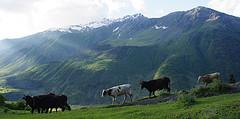
Frameworks for change will be posted when the cows come home. Short of a miracle or the long arm of reality change striking, it's going to take years. Changing my reality here is no joke.
As I noted in an earlier despairing blog, should I even start from here? Is the name, Change, suitable to refer to the 3rd Level in the Root Hierarchy (RL3)?
I'm pretty sure that the heart of Change, its Level 4, is stability or stabilizing. Can something that is stable be a form of change? Probably. If I called this Level Identity, then stabilizing would seem spot on. The heart of any identity is surely a stable state.
If I am asked to consult or advise regarding change, my first question is: "what is the situation?" A situation is a stable but dynamic state of affairs. It is never presented to me in full detail. How could it be? Sometimes I say "Tell me the story." This clarifies that I expect a meaningful construction of the forces, choices and events that led to the present state. That present state may not be stable in some absolute sense, but it is at least temporarily stable—even if clearly heading for disaster. Changing that reality was probably the reason for requesting help.
What if my client said they could not describe the situation? What if they just gave me piles of data (= Inquiry-RL2) and lists of things they had been recently doing (= Action-RL1)? I would be unable to assist because such behaviour would be equivalent to saying: "I am not coping." I would conclude that they were totally overwhelmed. I can only advise someone who is coping, but desirous of extra assistance.
So the first evidence that someone is coping is that they can construe their own situation. That they can be confident that it is as they are depicting it. Of course, I may discover otherwise following my own investigations. However, if what I discover is too discordant with what was initially described, then the person is again clearly not coping. They do not know what is going on. They are living in some sort of fantasy world. Changing fantasy is usually even harder than changing reality.
So where has this got us? I think it confirms that Change takes for granted the existence of a "state". I assume this state has a degree of structure, stability and continuity: which is equivalent to a reality that has an identity. It seems that a person can only change a reality-state if they can construe it sufficiently well. That means they have to be able to communicate about it, and remember that Communication-RL5 is what creates psychosocial reality.
So change is clearly exposing people to reality in a way that other levels do not. A person can be willing-RL7, can hold a value/goal-RL6, can communicate-RL5 something. None of that need engage with reality for it to be OK. A person can also have a whole range of feelings-RL4 as they do when watching a film. Action-RL1 can take place with only a superficial engagement with reality: enough not to be an idiot. Inquiries-RL2 thrive on the superficial and simple. In academia, they like to invent the reality they investigate by imposing concepts and setting up artificial experiments. That's much, much easier than engaging with the reality we have to live with on a daily basis.
None of these other 6 Levels of Will need take much notice of reality: and yet they can take you a long way in life. Who needs reality? Who wants reality?
Like it or not, change forces us to confront reality. You confront reality when you describe what has to be changed. You confront reality as you make the change. It confronts you afterwards when you consider what effect there has been. There is definitely a link between Psychosocial Reality and Change that does not exist in the other Root levels.
That's surely important.
Tell me what conclusions you draw from this.
WK
About
Warren Kinston